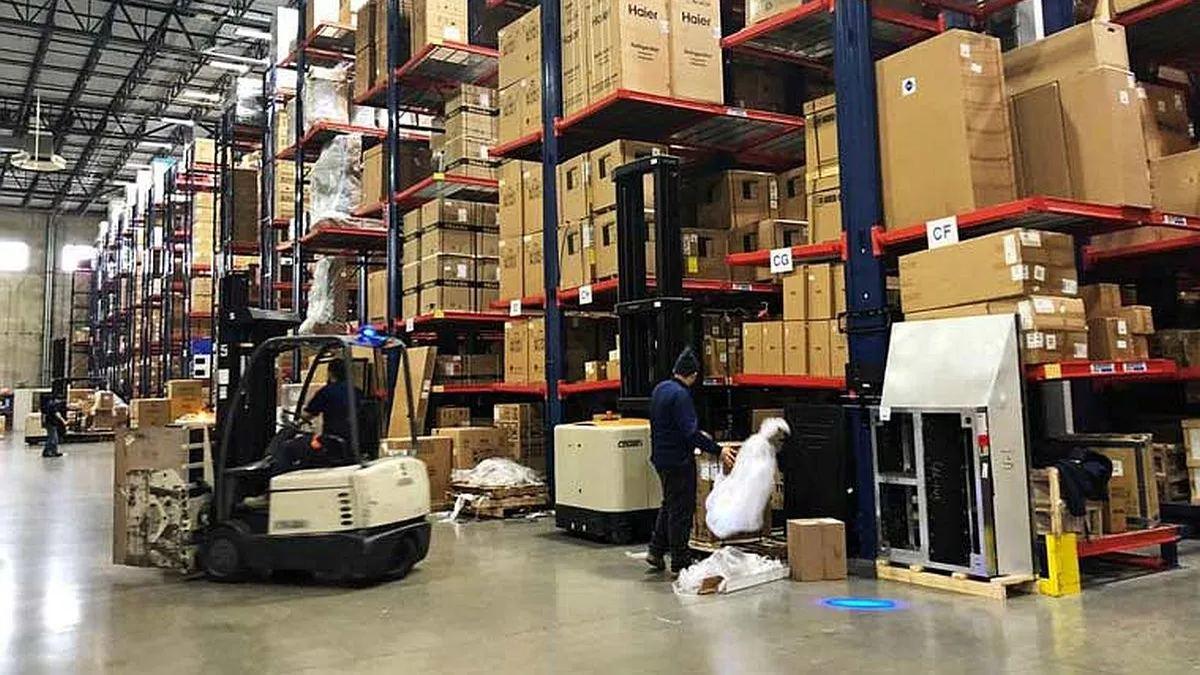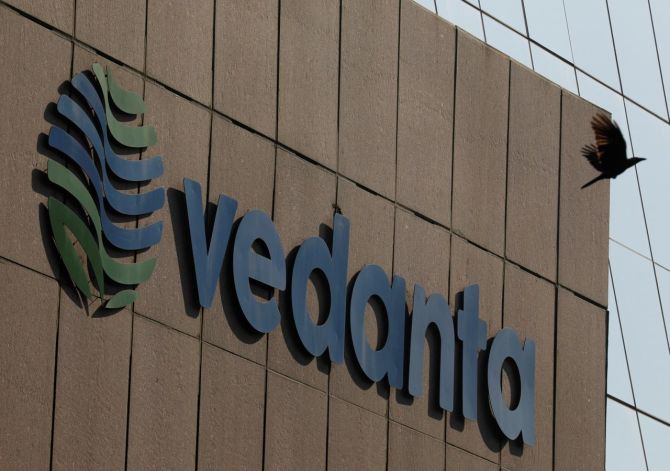Festive sales are expected to surge 27 per cent to cross Rs 120,000 crore in 2025, driving Amazon and Flipkart to expand warehousing capacity by millions of cubic feet and extend delivery networks to thousands of new pin codes — an infrastructure buildout that could reshape India’s retail landscape for years.

Kindly note the images in this report have only been published for representational purposes. Photograph: Simon Dawson/Reuters
In a cavernous warehouse stretching across 11 football fields in rural Karnataka, metallic robots whir alongside human workers, their mechanical symphony echoing through the hangar-sized space.
The air carries the scent of luxury soaps as workers pack everything from whey protein to Samsung phones and iPhones, while surveillance cameras track millions of rupees worth of inventory moving through Flipkart’s Malur fulfillment centre.
“We’re anticipating strong demand across beauty products, mobiles, electronics and large appliances this festive season,” said Hemant Badri, Flipkart’s head of supply chain, surveying the bustling operation.
“The headway is far better than the growth witnessed in previous years.”
This scene of controlled chaos reflects a broader arms race among India’s e-commerce giants as they prepare for the country’s most lucrative shopping period.
Festive sales are expected to surge 27 per cent to cross Rs 120,000 crore in 2025, driving Amazon and Flipkart to expand warehousing capacity by millions of cubic feet and extend delivery networks to thousands of new pin codes — an infrastructure buildout that could reshape India’s retail landscape for years.

Photograph: Russell Cheyne/Reuters
Walmart-owned Flipkart is expanding its supply chain network ahead of its Big Billion Days sale, adding fulfilment centres and last-mile hubs in key states including Uttar Pradesh, Bihar, Haryana and Tripura.
The move will strengthen regional reach, speed up deliveries and support the rise of quick commerce. The latest expansion spans 3.5 million square feet and covers over 21,000 pin codes across India.
The firm has added new facilities in Guwahati, Singur and Saidham, expanding on recent launches in cities such as Varanasi, Patna and Manesar.
It now operates more than 100 fulfilment centres nationwide, enabling it to handle millions of festive orders with greater speed.
“We are creating a backbone for the festive season,” said Badri. “We are building a network that is faster, closer to the customer and has sufficient capacity to meet demand.”
Alongside large-scale fulfilment centres, Flipkart is scaling its quick commerce backbone through nearly 400 new micro-fulfilment centres and dark stores across 19 cities.
This network underpins Flipkart Minutes, which has doubled order volumes every 45 days since launch, enabling faster delivery of essentials and festive products.
As part of festive preparations, Flipkart has created more than 220,000 seasonal jobs across warehousing, logistics and last-mile delivery roles, including opportunities for persons with disabilities (PwDs) and other groups.
“From metros to Tier-2 and Tier-3 cities, our focus remains on delivering convenience, strengthening regional economies and building a future-ready supply chain powered by technology and inclusivity,” said Badri.

Amazon, Flipkart’s chief rival, has announced a major expansion of its operations network with 12 new fulfilment centres (FCs) and the expansion of six others.
This adds 8.6 million cubic feet of storage capacity — the equivalent of 100 Olympic-sized swimming pools.
The expansion brings the first Amazon FCs to Hooghly, Tiruvallur, Krishnagiri, Visakhapatnam and Hubballi. Amazon also announced six new sort centres (SCs) in Hubli, Trivandrum, Rajpura, Gorakhpur, Moradabad and Prayagraj with a combined area of 500,000 sq ft.
“As India gets ready for the festive season, we are preparing to enable sellers to serve customers across the country,” said Abhinav Singh, Vice-President for Operations, India and Australia, Amazon.
“The 12 new fulfilment centres and six new sort centres will significantly boost our ability to provide customers with the fastest, safest and most reliable deliveries.”
Amazon India has created more than 150,000 seasonal jobs across its operations network.
Earlier this year, it announced Rs 2,000 crore (Rs 20 billion) of fresh investment in its infrastructure networks and recently launched five new FCs in Delhi NCR, Indore, Bhubaneswar, Kochi and Rajpura.
According to a report by Datum Intelligence, festive sales are expected to grow 27 per cent to about Rs 120,000 crore in 2025.
In urban India, consumer sentiment turned net positive for the first time in three years, with 37.6 per cent reporting higher non-essential spending in July 2025 — signalling a decisive rebound in discretionary demand.
In rural India, non-essential spending surged to 54.7 per cent in July 2025 — the highest in two years — with net sentiment at +37.2, pointing to expectations of further growth ahead of the festive season.
E-commerce spending has shown a clear uptick since March 2025, reflected in both credit card and UPI transaction volumes.
Online fashion retailer Myntra is also scaling up to ensure a seamless shopping experience for millions of customers across the country.
It is expanding warehousing and fulfilment infrastructure, strengthening last-mile delivery in Tier-2 and Tier-3 cities, and onboarding additional temporary and gig workers in warehousing, delivery and customer service.
“Early demand trends point to ethnic wear leading the pack — women’s kurtas, sarees and fusion styles, alongside men’s kurta sets and Nehru jackets,” said Bharath Kumar, Head of Revenue and Growth, Myntra.
“Luxury and premium segments, too, are witnessing heightened interest, particularly in gifting categories such as designer bags, premium watches and skincare hampers.”
Myntra has also introduced a festive zero-commission programme for emerging women’s ethnic wear brands, aiming to onboard 500 homegrown, digital-first labels over the next three months.
Swiggy’s quick commerce arm Instamart has been preparing for the festive season for the past three months.
During Janmashtami, demand spiked for pooja essentials, Krishna basuris, kids’ outfits, laddoo gopal idols and poshaks.
Instamart is stocking up early across dark stores and scaling staffing and delivery partners to uphold its 10-minute delivery promise.
“While metros lead demand, Tier-2 and Tier-3 cities are driving a growing share of festive traffic, making this Instamart’s most ambitious festive season yet,” said an Instamart spokesperson.
Feature Presentation: Rajesh Alva/Rediff




